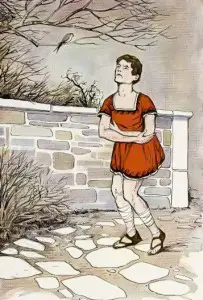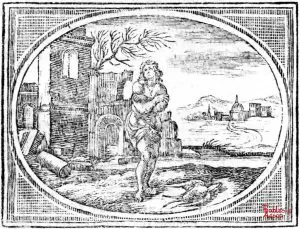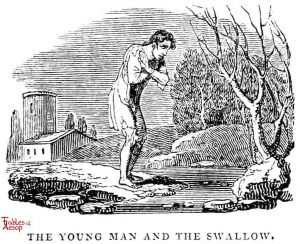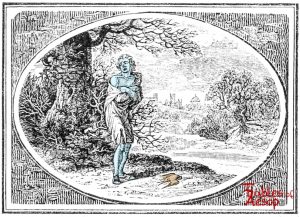A man saw a Swallow early in the season and sold his coat. The weather turned cold again and the man bemoaned that it would kill him and the Swallow.
Don’t draw a conclusion based on a single observation.

Aesop For Children
A young fellow, who was very popular among his boon companions as a good spender, quickly wasted his fortune trying to live up to his reputation. Then one fine day in early spring he found himself with not a penny left, and no property save the clothes he wore.
He was to meet some jolly young men that morning, and he was at his wits’ end how to get enough money to keep up appearances. Just then a Swallow flew by, twittering merrily, and the young man, thinking summer had come, hastened off to a clothes dealer, to whom he sold all the clothes he wore down to his very tunic.
A few days later a change in weather brought a severe frost; and the poor swallow and that foolish young man in his light tunic, and with his arms and knees bare, could scarcely keep life in their shivering bodies.
Moral
One swallow does not make a summer.

Townsend version
A young man, a great spendthrift, had run through all his patrimony and had but one good cloak left. One day he happened to see a Swallow, which had appeared before its season, skimming along a pool and twittering gaily. He supposed that summer had come, and went and sold his cloak. Not many days later, winter set in again with renewed frost and cold. When he found the unfortunate Swallow lifeless on the ground, he said, “Unhappy bird! what have you done? By thus appearing before the springtime you have not only killed yourself, but you have wrought my destruction also.”

Samuel Croxall (The Young Man and the Swallow)
A PRODIGAL young spendthrift, who had wasted his whole patrimony in taverns and gaming-houses, among lewd, idle company, was taking a melancholy walk near a brook. It was in the month of January; and happened to be one of those warm sunshiny days which sometimes shine upon us even in that winterly season of the year; and to make it more flattering, a Swallow, which had made his appearance, by mistake, too soon, flew skimming along upon the surface of the water. The giddy youth observing this, without any farther consideration, concluded that summer was now come, and that he should have little or no occasion for clothes, so went and pawned them at the broker’s, and ventured the money for one stake more, among his sharping companions. When this too was gone the same way with the rest, he took another solitary walk in the same place as before. But the weather being severe and frosty, had made every thing look with an aspect very different from what it did before; the brook was quite frozen over, and the poor Swallow lay dead upon the bank of it: the very sight of which cooled the young spark’s brains; and coining to a kind of sense of his misery, he reproached the deceased bird, as the author of all his misfortunes: All, wretch that thou wert! says he, thou hast undone both thyself and rue, who was so credulous as to depend upon thee.
THE APPLICATION
They who frequent taverns and gaming-houses, and keep bad company, should not wonder if they are reduced in a very small time, to penury and want. The wretched young fellows, who once addict themselves to such a scandalous kind of life, scarce think of, or attend to any one thing besides. They seem to have nothing else in their heads, but how they may squander what they have got, and where they may get more when that is gone. They do not make the same use of their reason that other people do: but, like the jaundiced eye, view every thing in that false light in which their distemper and debauchery represent it. The young Man in the fable gives us a pretty example of this; he sees a swallow in the midst of winter, and instead of being surprised at it, as a very irregular and extraordinary thing, concludes from thence that it is summer, as it he had never thought before about the season. Well, the result of this wise conclusion is of a piece with the conclusion itself; if it is summer, he shall not want so many clothes, therefore he sells them: For what? More money to squander away; as if (had this observation been just) summer would have lasted all the year round. But the true result and conclusion of all this is: when both his money and clothes are irrecoverably gone, he comes to his right senses; is ready to perish with hunger, to starve with cold, and to tear his own flesh with remorse and vexation at his former stupidity.

Thomas Bewick (The Young Man and The Swallow)
A prodigal thoughtless young Man, who had wasted his whole patrimony in taverns and gaming-houses, among his lewd idle companions, was taking a melancholy walk near a brook. It was in the spring, while the hills were yet capped with snow, but it happened to be one of those clear sunny days which some times occur at that time of the year; and to make appearances the more flattering, a Swallow which had been invited forth by the warmth, flew skimming along upon the surface of the water. The Youth observing this, concluded that the summer was now come, and that he should have little or no occasion for clothes, so went and pawned them, and ventured the money for one stake more, among his sharping [sharping = Swindling] associates. When this too was gone, like all the rest of his property, he took another solitary walk in the same place as before, but the weather being severe and frosty, every thing had put on a very different aspect; the brook was frozen over, and the poor Swallow lay dead upon the bank. At this, the Youth, smarting under the sense of his own misery, mistakingly reproached the Swallow as the cause of all his misfortunes: he cried out, oh, unhappy bird, thou hast undone both thyself and me, who was so credulous as to trust to thy appearance.
APPLICATION
They who frequent taverns and gaming-houses, and keep bad company, should not wonder if they are reduced in a very short time to penury and want. The wretched young fellows who once addict themselves to such a scandalous course of life, scarcely think of or attend to any thing besides: they seem to have nothing else in their heads but how they may squander what they have got, and where they may get more when that is gone. They do not make the same use of their reason as other people, but like the jaundiced eye, view every thing in a false light, and having turned a deaf ear to all advice, and pursued their unaltered course until all their property is irrecoverably lost, when at length misery forces upon them a sense of their situation, they still lay the blame upon any cause but the right one–their own extravagance and folly; like the Prodigal in the fable, who would not have considered a solitary occurrence as a general indication of the season, had not his own wicked desires blinded his understanding.

JBR Collection
A Prodigal young fellow, who had run through all his money, and even sold all his outer clothes except his cloak, seeing a Swallow skimming over the meadows one fine day in the early spring, believed that summer was really come, and sold his cloak too. The next morning there happened to be a severe frost, and, shivering and nearly frozen himself, he found the Swallow lying stiff and dead upon the ground. He thereupon upbraided the poor bird as the cause of all his misfortunes. “Stupid thing,” said he, “had you not come before your time, I should not now be so wretched as I am.”

L’Estrange version (A Young Man and A Swallow)
A prodigal young fellow that had sold his cloths to his very shirt, upon the sight of a swallow that came abroad before her time, made account that summer was now at hand, and away went that too. There happen’d after this, a fit of bitter cold weather, that almost starv’d both the bird, and the spendthrift. Well (says the fellow to himself) this sot of a swallow has been the ruine of us both.
Moral
Extraordinary cases are excepted out of the general rules of life: so that irregular accidents and instances are not to be drawn into precedent.

Hirundo et Iuvenis
Temulentus et dissolutus quidem iuvenis, qui patrimonium integrum decoxerat, ipsa etiam vestimenta solebat pro pecuniis venum dare. Ad hoc, ex augurio circumvolantis hirundinis coniiciens iam aestatem appropinquasse, illico vestitus exuit et seminudus in popinas delituit. Sed, cum brumae reliquiae redeuntes maiori frigore saeviebant et hirundinem enecassent, iuvenis tandem circumvagabatur et, aviculam mortuam offendens, inquit, “O infelicem augurem et tui et mei infortunii!”
Perry #169



